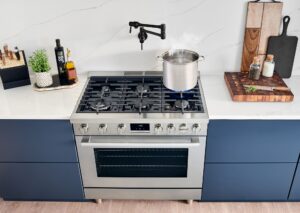If you’re experiencing the frustration of trying to turn on your oven and nothing happens, it’s important to understand that there could be a variety of reasons why this is happening. Before you panic and call for professional help, it’s always best to troubleshoot the issue yourself. Here are some reasons why your oven won’t turn on:
1. Power Supply Issues
One of the most common reasons for an oven not turning on is because of power supply issues. Check if your oven is plugged in properly and that the outlet is working by testing it with another appliance. If the outlet seems fine, then there may be a problem with the circuit breaker or fuse box.
2. Tripped Circuit Breaker
In some cases, an overloaded circuit can cause a tripped circuit breaker, which will cut off power to your oven. This can happen when you run too many appliances at once or use high-powered devices near each other. Check your circuit breaker panel and see if any switches have been tripped; if so, reset them and try turning on your oven again.
3. Faulty Wiring
Another reason for your oven not turning on could be faulty wiring within the appliance itself. Over time, wires can become loose or damaged, disrupting the electrical connection needed for the oven to function properly.
4. Broken Heating Element
The heating element in an electric oven is responsible for generating heat and cooking food evenly. If this component becomes damaged or burned out, then it may prevent your oven from turning on, as it cannot produce heat without a functioning element.
5. Malfunctioning Control Panel
The control panel acts as the brain of your oven, allowing you to adjust settings such as temperature and cooking time. If this component malfunctions or gets damaged, then it can affect all other functions of the appliance, including its ability to turn on.
6. Faulty Igniter
Gas ovens use an igniter to light the gas and create heat for cooking. If the igniter is not working properly, then it will prevent your oven from turning on as there is no way for the gas to ignite.
7. Broken Door Sensor
Most modern ovens have a safety feature that prevents the oven from turning on if the door is not sealed. If the door sensor is broken or malfunctioning, then it may prevent your oven from turning on even if the door is closed.
8. Defective Thermostat
The thermostat in your oven is responsible for regulating the temperature and ensuring that it stays consistent throughout the cooking process. If this component becomes defective, then it may affect the oven’s ability to turn on and maintain the desired temperature.
9. Clogged Burners or Gas Lines
If you have a gas oven and are experiencing difficulties with it turning on, then there may be an issue with clogged burners or gas lines. This can happen if there is a buildup of dirt or debris in these areas, preventing proper gas flow to the burners.
10. Malfunctioning Safety Valve
Gas ovens also have a safety valve that controls the flow of gas to the burners. If this component malfunctions, then it will prevent your oven from turning on as it cannot regulate the amount of gas needed for cooking.
It’s important to regularly maintain and troubleshoot your oven if you encounter any problems with it turning on. By identifying and addressing these reasons for your oven not turning on, you can save time and money on repairs or replacements. Remember to always practice proper safety precautions when handling electrical and gas appliances.
Importance of Oven Maintenance
Regular maintenance is crucial for keeping your oven in good working condition. Not only can it help prevent issues with turning on, but it also ensures that your oven is functioning safely and efficiently. Here are some reasons why maintaining your oven is important:
- Safety: Ovens use high heat and electricity or gas, making them potential safety hazards if not properly maintained. Regular maintenance allows for early detection of any potential safety risks and ensures that your oven is functioning safely.
- Energy Efficiency: A well-maintained oven operates more efficiently, using less energy to cook your food. This can save you money on utility bills in the long run.
- Longer Lifespan: Just like any other appliance, an oven that is regularly maintained will have a longer lifespan. This means you won’t have to replace it as often, saving you money in the long run.
- Better Cooking Results: Ovens that are clean and well-maintained can cook food more evenly and accurately, resulting in better-tasting dishes.
- Cost Savings: Regular maintenance can help identify and address small issues before they become larger, more expensive problems. This can save you money on costly repairs or replacements.
In this article, we discussed ten common issues why your oven may not be turning on, ranging from power supply issues to faulty components. It’s important to troubleshoot these issues and address them promptly to ensure your oven continues to function properly.
We also highlighted the importance of regular maintenance in keeping your oven safe, efficient, and long-lasting. Remember to always practice safety precautions when handling electrical and gas appliances, and seek professional help if needed.
